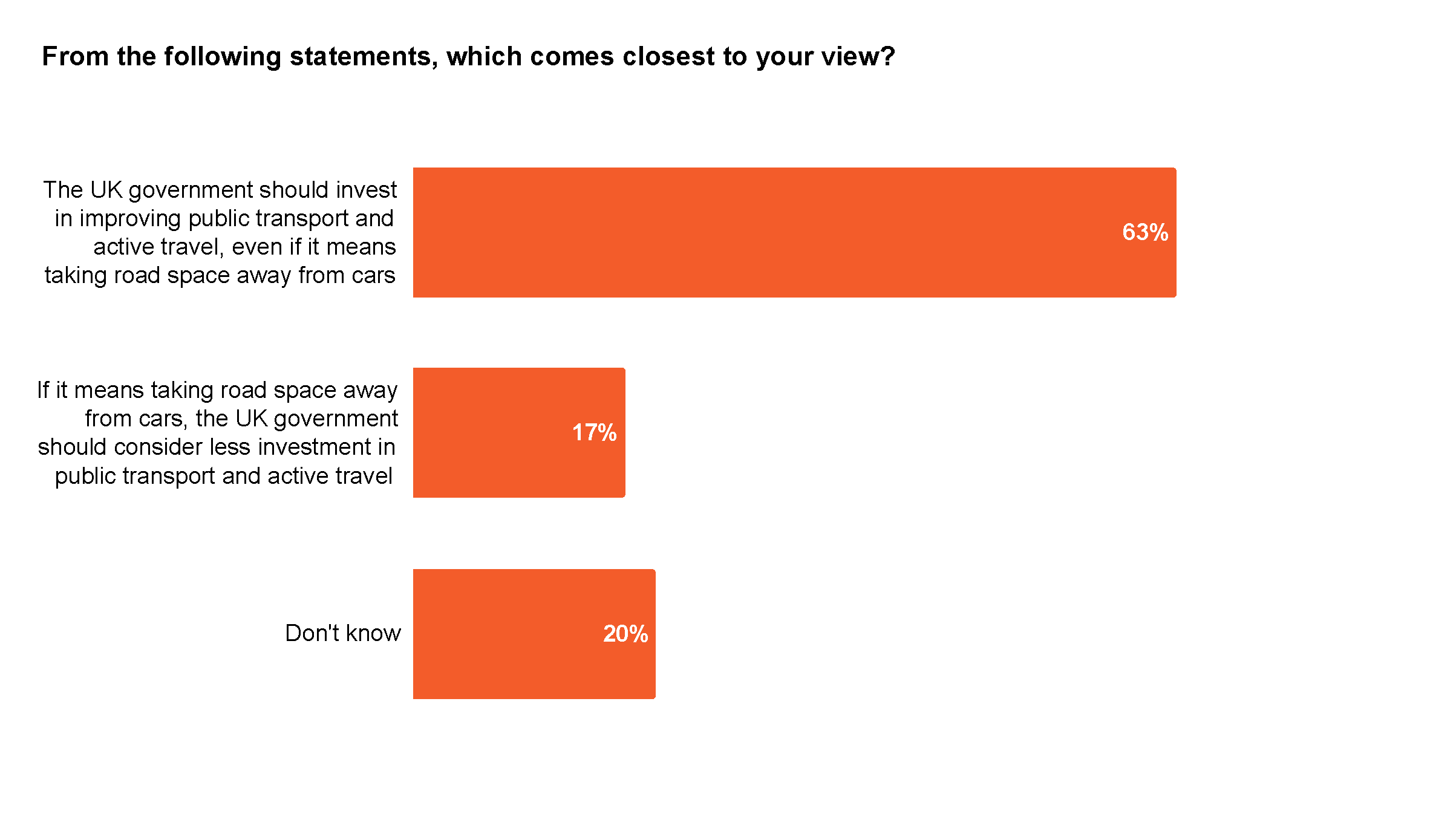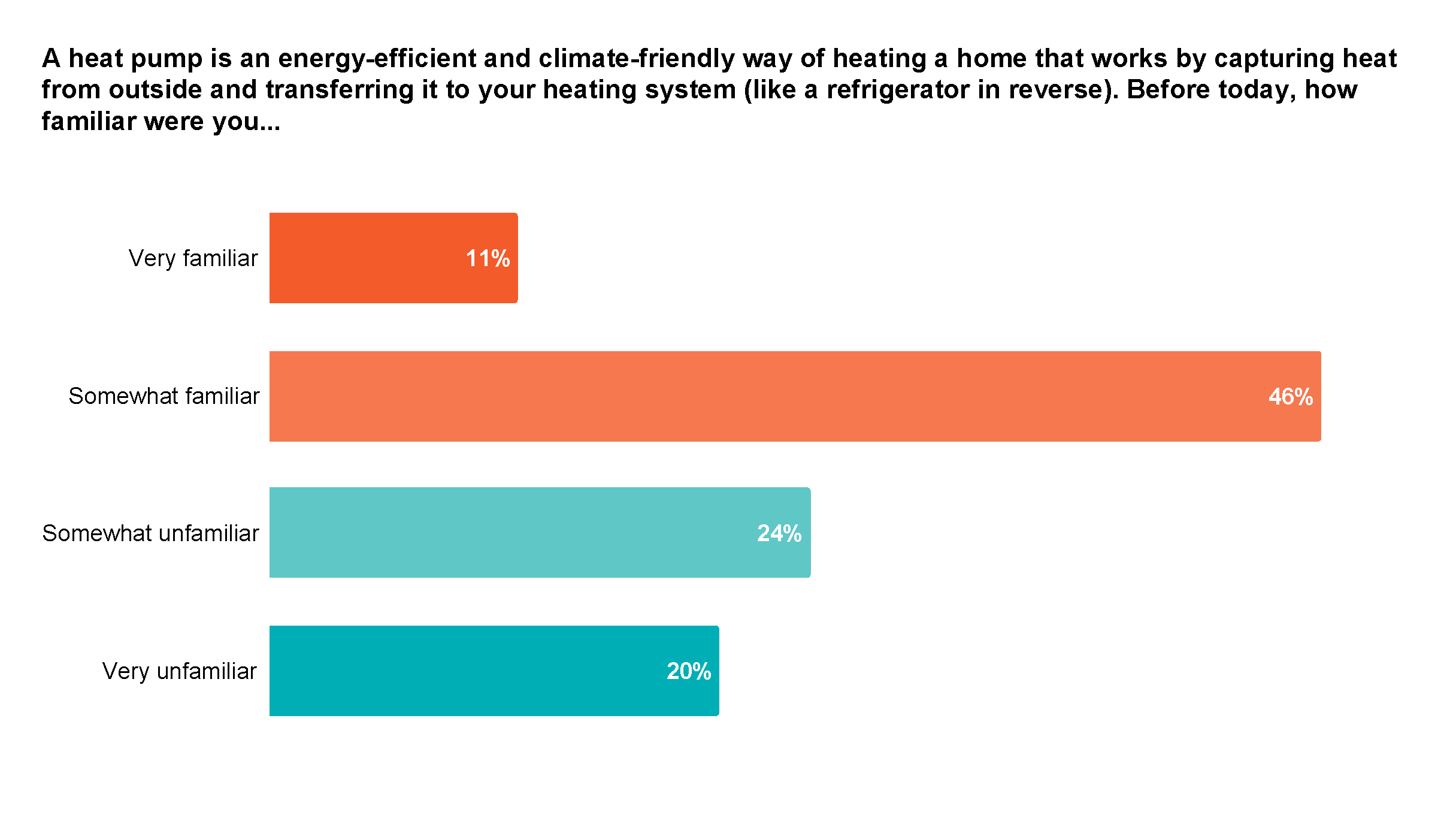Policies
Tackling climate change means changes to the way we get around, where our energy comes from and how we heat our homes. The next decade requires ambitious roll out of these policies, and some others.
This section explores peoples views on a number of different climate policies, with a particular focus on energy, transport and home heating. We find that fairness, affordability and inclusiveness are vital.
People are supportive of the transition to clean energy.
People are more supportive than not of:
- their local authority giving permission to new local solar or wind projects (average score of 6.5 out of 10; where 0 means feeling very negative about the policy and 10 means feeling very positive about the policy).
- the UK government committing to spending billions of pounds on expanding renewable energy (average score of 6.1 out of 10).
- the UK government putting a ban on new licences for oil and gas exploration in the North Sea (average score of 5.3 out of 10).
There is strong appetite for government to protect nature, reduce pollution and boost clean energy.
We asked people to rank the issues that they felt were most important.
The lowest items on the list are not actively opposed, but resonate less strongly for people.
People want to protect nature, and are more drawn to actions that feel most immediate and visceral. In line with other research, ‘pollution’ appears to be a more resonant term than ‘emissions’ when talking about climate policies.
Opposition to climate policy is less strong than we’re often led to believe - except when it feels unfair.
To explore how much people push back on a range of actual and more extreme climate and nature policy approaches, we asked what people think ‘goes too far.’
We found that there’s fairly low opposition to a range of policy approaches.
Perception of whether various climate policies ‘go too far’ (Data: More in Common, January 2024)
| Policy* | Proportion of people who think this ‘goes too far’ |
| Giving more land over to nature, even if it reduces farmland | 18% |
| Introducing a tax for extraordinary profits of oil and gas companies | 20% |
| Cutting subsidies to support farmers who aren’t willing to transition to more sustainable practices | 26% |
| Providing financial aid to developing countries to support efforts to adapt to climate change | 28% |
| Charging people more if they choose to fly | 32% |
| Immediately banning all drilling for oil and gas in the North Sea | 33% |
| Expecting everyone to pay for new low-carbon technologies themselves | 51% |
*This table excludes the option of ‘none of the above’ which 15% of respondents selected
A majority of people push back on the idea of ‘expecting everyone to pay for new low-carbon technologies themselves’.
People have a deeply-held need for things to be fair. They don’t think that everyone should be expected to face and pay for climate change by themselves, especially the poorest in society.
Fifteen percent do not believe any of the range of policies ‘go too far.’ Climate policies are frequently framed as excessive. These results suggest that for most policy areas, this will only resonate with a minority of people.
Costs to individuals top concerns around the impact of climate policy.
We asked participants: Thinking about what the UK government might do in the next 10 years to tackle climate change and transition away from fossil fuels, which of the following potential impacts, if any, would you be most worried about? From a list of 16 options, respondents could select up to three impacts. The top 5 most frequently cited impacts were:
- Higher energy bills
- Higher taxes
- Extra burden on vulnerable people
- A weaker economy
- Less reliable energy
People are more likely to feel concerned about the costs to individuals, including those seen as vulnerable, than costs to society as a whole.
Transport policies: how are people thinking and feeling about transport options and possible policy change?
Most people are not regular public transport users
Public transport use varies a lot depending on where people live. In cities and large towns the majority use it at least once a week, some much more often. But 42% of people in rural areas say they never use it at all.
Many associate cars with convenience and public transport with stress.
Most people don’t associate public transport with positive things. For it to be a more valid option for more people, more of the time, it’ll need to be more accessible, reliable and appealing.
Most people support prioritising road space for public transport and active travel over car use.
More people assume changes to public transport policies will be fair than unfair.
While people lean towards assuming public transport policy will be fair to them, there are mixed feelings and a quarter of people are unsure.
Almost two thirds of people in cities and large towns, where people use public transport more frequently, assume these changes will be fair to them.
When it comes to car reduction in cities, people are more likely to feel mistrustful of governments on this than on other aspects of transition. In England, 26% said they trust neither national nor local government to reduce car use in cities.
People on lower incomes and those who are more reliant on their car for everyday life, say they are less sure transport changes will be fair to them.
Leaders and communicators need to show how improvements to public transport will be fair, inclusive and will open up better options around the country.
Home heating: how are people thinking and feeling about boilers, heat pumps and possible policy change?
People are divided on whether home heating policies will be fair or unfair.
Assumptions around fairness of home heating policies vary strongly by income level. Almost half of those on the lowest income assume change in this area will be unfair to them.
People who have a heat pump are most satisfied with how they heat their home.
Highlighting the positive experiences of people who have heat pumps will build familiarity and enthusiasm. Rolling them out widely will mean making sure they’re affordable for a wider range of people.
Find out more on climate leadership in Scotland and Wales.
Find out more on climate leadership across the seven segments.
Continue exploring
Sign up to our newsletter
Thank you for signing up to our newsletter
You should receive a welcome email shortly.
If you do not receive it, please check your spam folder, and mark as 'Not Spam' so our future newsletters go straight to your inbox.


